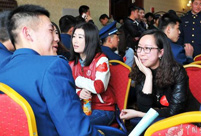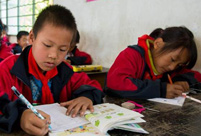 'Model husband' shatters image of love
'Model husband' shatters image of love
 Can animals smile? Or put on a happy face
Can animals smile? Or put on a happy face
 Geng Xuan crowned at 9th China Super Model Contest
Geng Xuan crowned at 9th China Super Model Contest
 Top 10 billionaires in the liquor industry
Top 10 billionaires in the liquor industry
 Backstage at China Fashion Week
Backstage at China Fashion Week
 Ballerinas anywhere but onstage
Ballerinas anywhere but onstage
 Top 10 safest airlines in the world
Top 10 safest airlines in the world
 Posters of 33rd HK Film Awards unveiled
Posters of 33rd HK Film Awards unveiled
 Top 10 most popular instant messaging apps in the world
Top 10 most popular instant messaging apps in the world
 Inspiring shadow images of Chinese army
Inspiring shadow images of Chinese army
BOAO, Hainan, April 9 -- Senior economists have been proposing adjustments to the export-reliant economic models of developing countries after an address on the subject at the ongoing Boao Forum for Asia (BFA) 2014 Annual Conference.
U.S. stimulus tapering has made life difficult for economies that have long been driven by exporting activity. There is agreement that many must now look elsewhere for growth, with the experts even suggesting that the withdrawal of global liquidity may help in pushing them along a path to country-specific reform agendas and regional partnerships.
Emerging markets (EMs) have been reeling since the beginning of 2014. The currencies and stock markets of countries including Argentina, South Africa and Turkey have fallen substantially, prompting their central banks to raise interest rates to stem capital outflows.
"The winding-down of QE may spell trouble for emerging countries with over-reliance on foreign capital and exports," said Li Xiangyang, head of the National Institute of International Strategy with the Chinese Academy of Social Sciences, on Wednesday at the BFA conference. "It should ring alarm bells for them to seek a way out through reform and cooperation."
Li's speech echoed a report released recently by the Boao Forum for Asia Institute, which pointed to EMs facing economic slowdown while developed countries such as the United States and Europe regain momentum.
MOMENTUM FROM WITHIN
The impact of the withdrawal of quantitative easing (QE) varies from country to country, but those with external imbalances or a reliance on external funding have been most vulnerable.
"The good old days of cheap labor, massive infrastructure investment and booming exports for Asian countries are gone amid the global economic downturn and financial fluctuation. They need to seek new growth engines," said Shan Weijian, chairman and CEO of the Pacific Alliance Group.
QE tapering is most likely to have a negative impact on countries that lack buffers such as hard currency reserves or policy tools such as a floating exchange rate, according to a Moody's report.
The World Bank predicted average GDP growth among Asian developing economies this year would drop from last year' s 7.1 percent.
It's time for them to instigate structural reforms to rely more on productivity and efficiency improvements, said Zhou Wenzhong, secretary general of the BFA.
"They should give the market more say in allocating resources to encourage new growth engines," Zhou added.
Merrill Lynch noted earlier this year that China, which is itself undergoing sweeping reforms, had generally remained immune to the stepped-up QE tapering, thanks to its sustained current-account surplus, low foreign debt, huge exchange reserves, high savings and capital controls.
Other Asian economies should follow China's lead and promote expansive reforms on the financial, education, medical and environmental protection fronts to avoid the middle-income trap, advised Stephen P. Groff, vice-president of the Asian Development Bank.

 Wonderful moment of China's airborne forces
Wonderful moment of China's airborne forces Bai Baihe shoots for fashion magazine
Bai Baihe shoots for fashion magazine Red terraced fields in Dongchuan of Yunnan
Red terraced fields in Dongchuan of Yunnan Jiaju Tibetan Village
Jiaju Tibetan Village Spring dating
Spring dating Confucius institute at UC Davis
Confucius institute at UC Davis Little painted faces at temple fair
Little painted faces at temple fair Top 10 safest airlines in the world
Top 10 safest airlines in the world Foreign students at China-Myanmar border
Foreign students at China-Myanmar border The backstage of the Fashion Week
The backstage of the Fashion Week College students in Han costumes
College students in Han costumes Postgraduate works as waitress
Postgraduate works as waitress Life in a Lahu village in Yunnan
Life in a Lahu village in Yunnan An orphan’s wedding
An orphan’s wedding Hollywood documentary brings Diaoyu Islands truth to new audience
Hollywood documentary brings Diaoyu Islands truth to new audienceDay|Week|Month